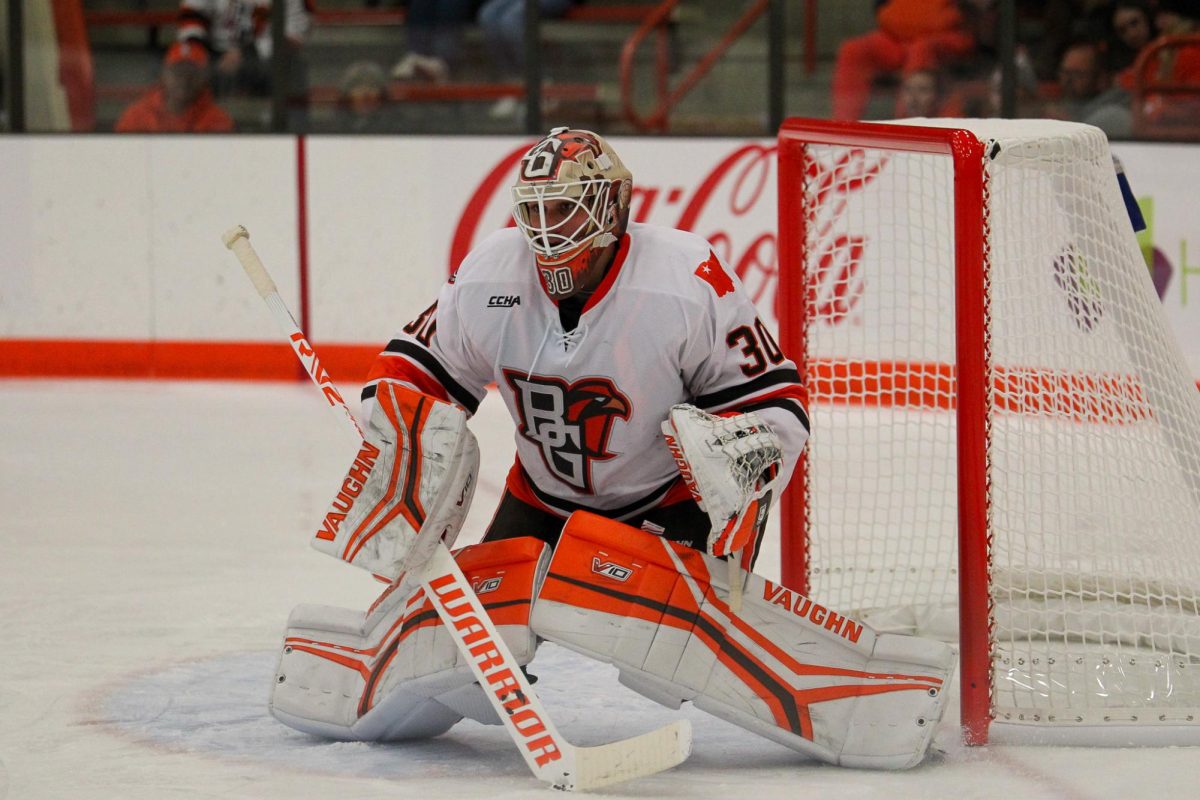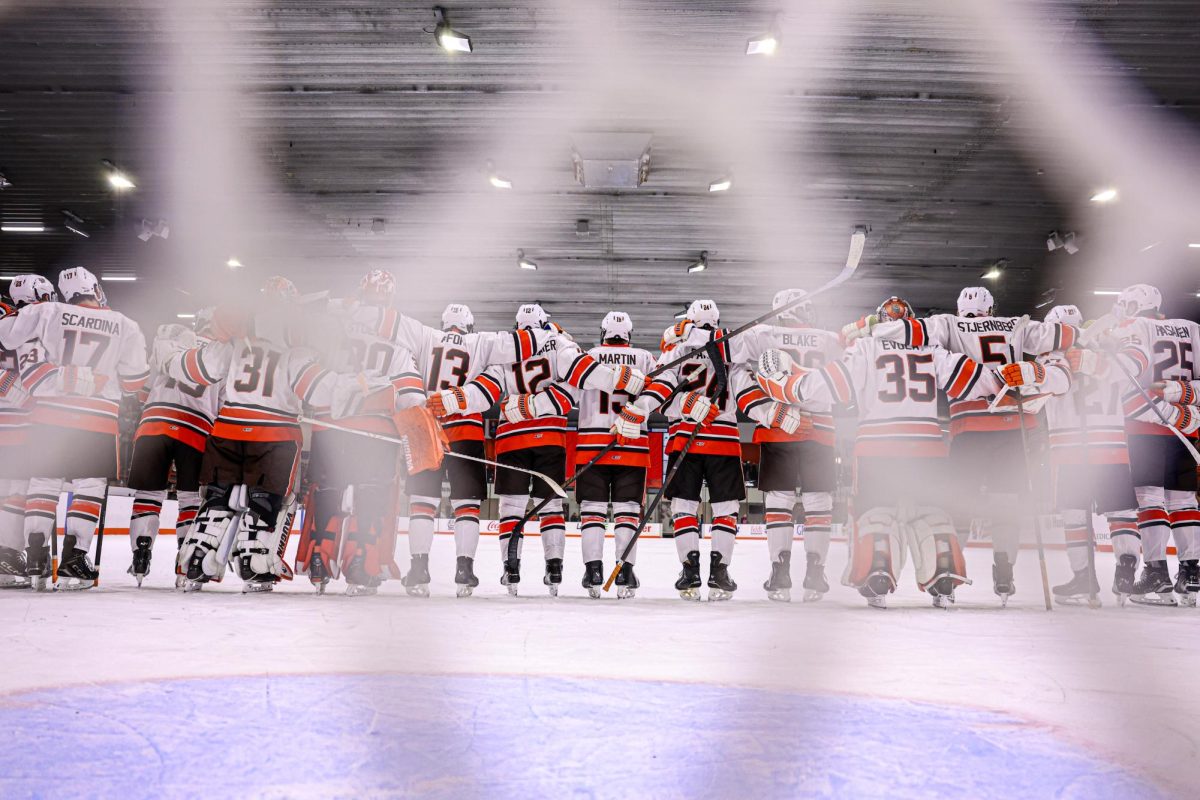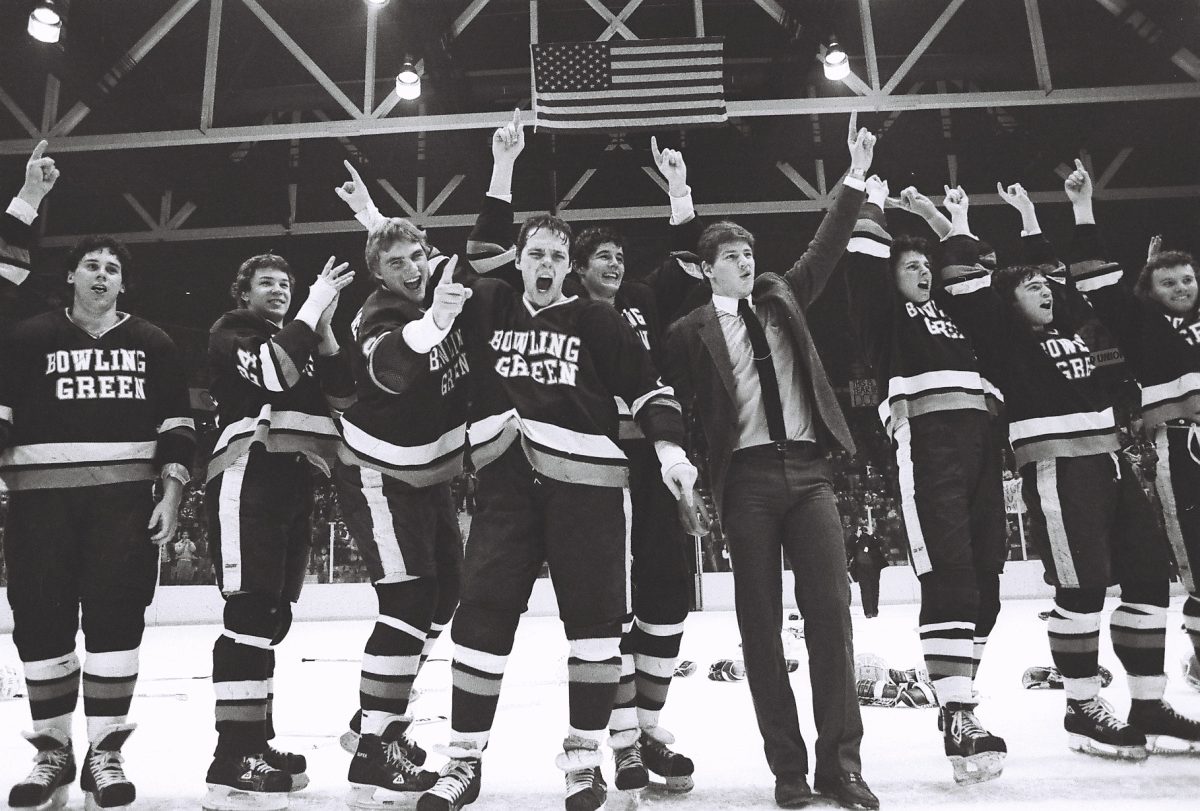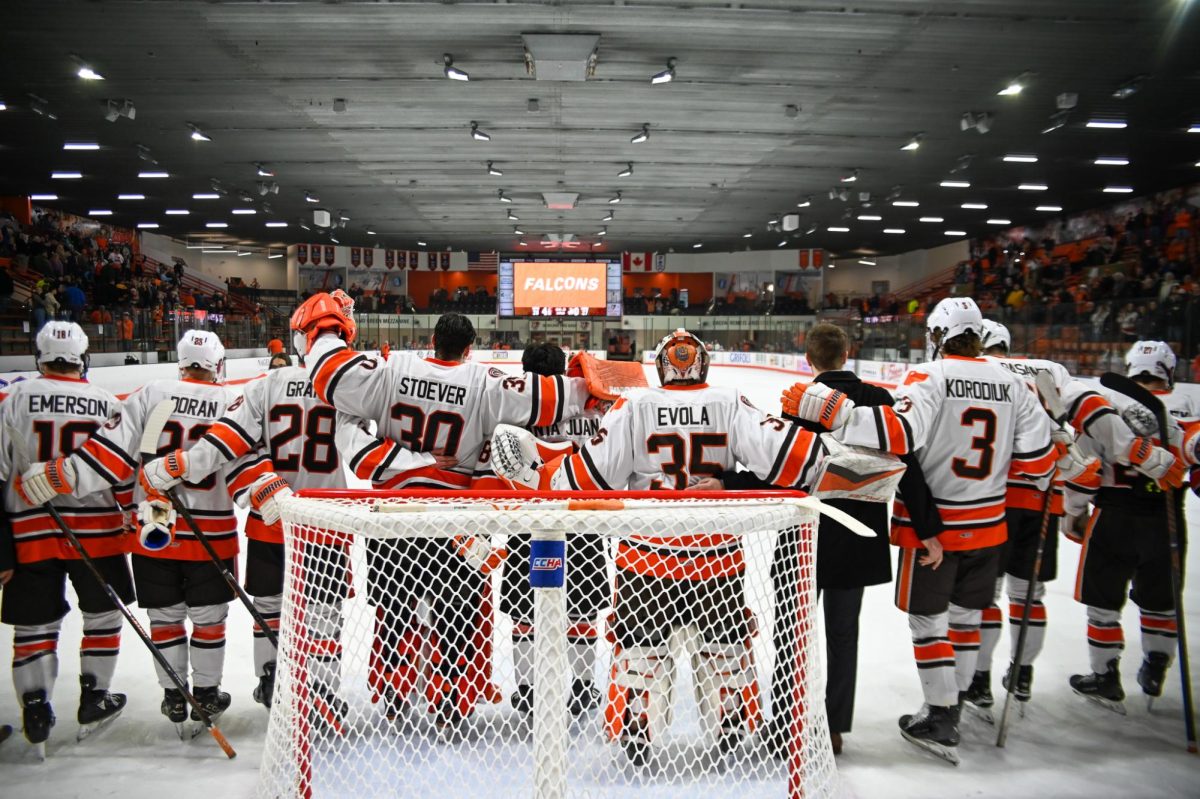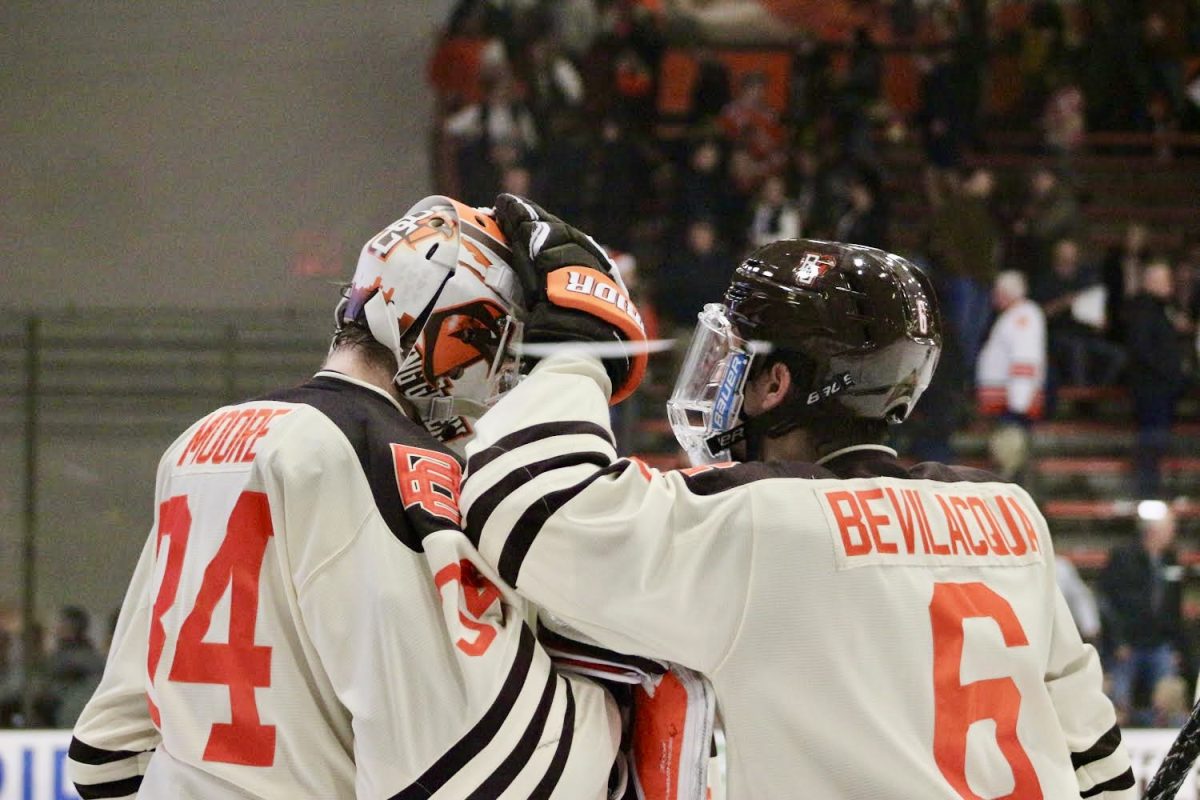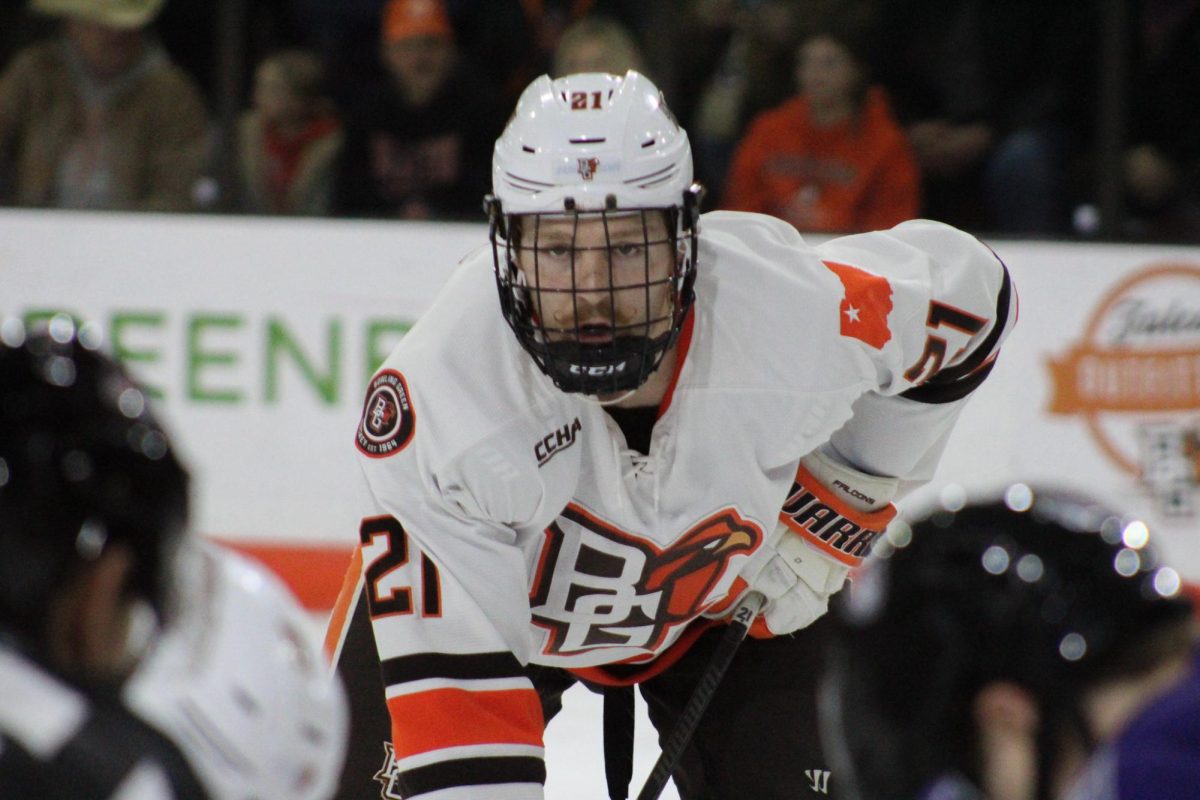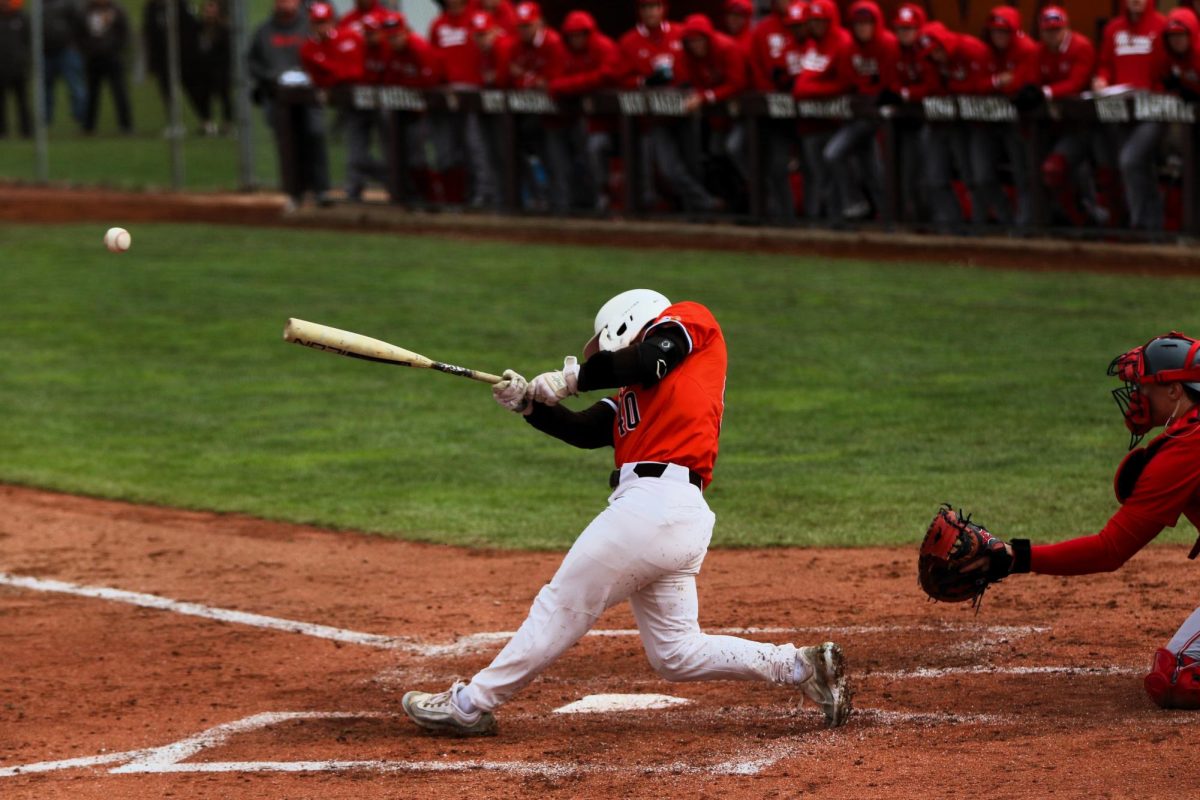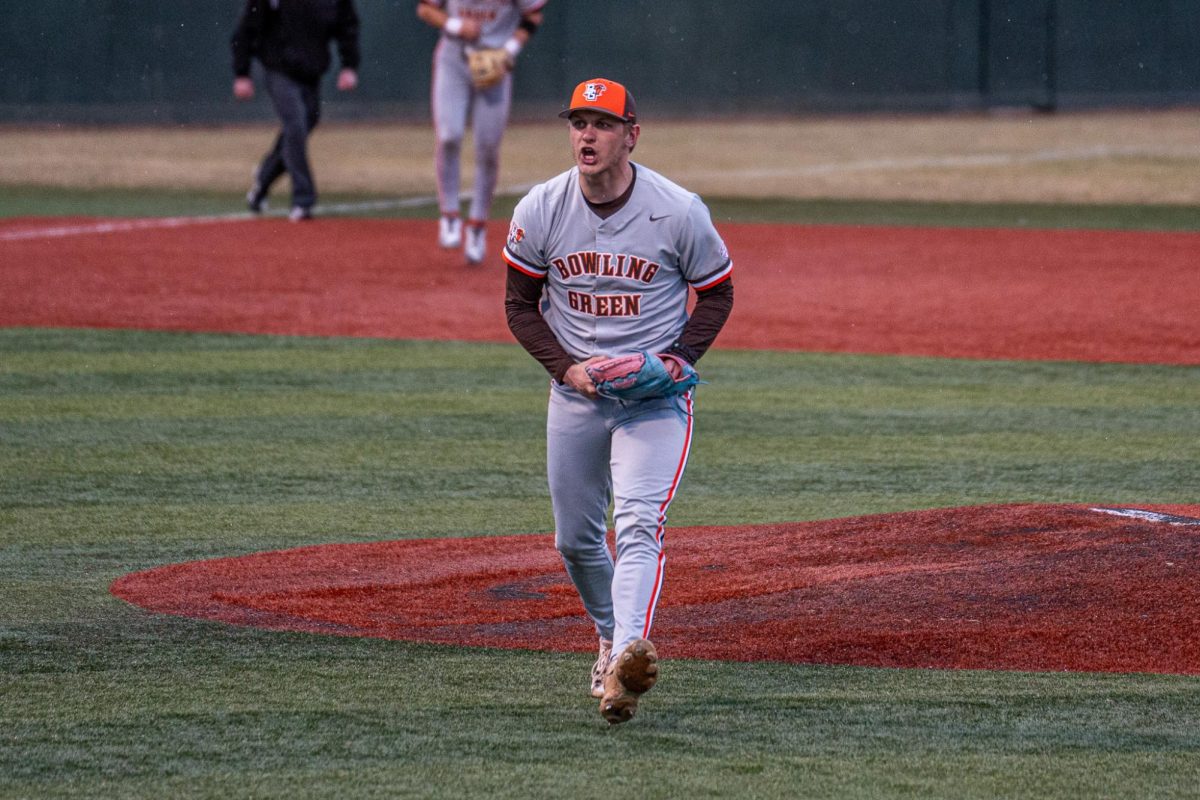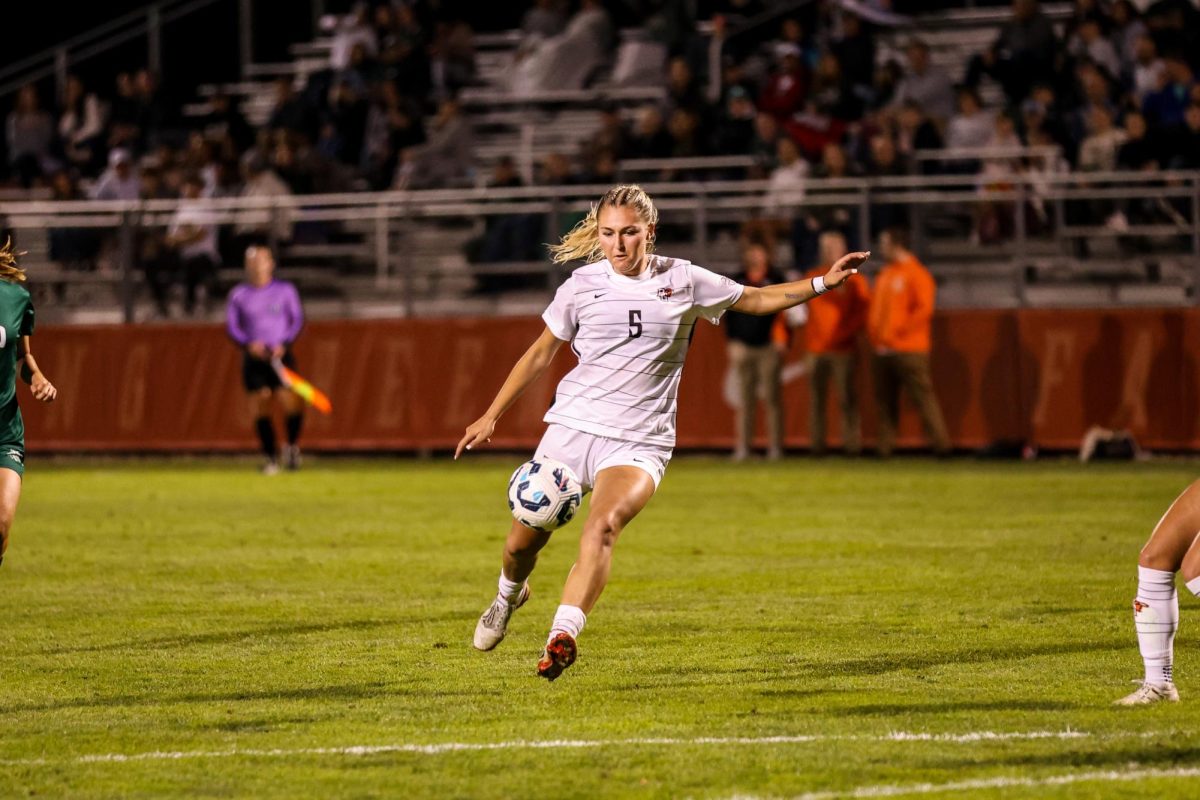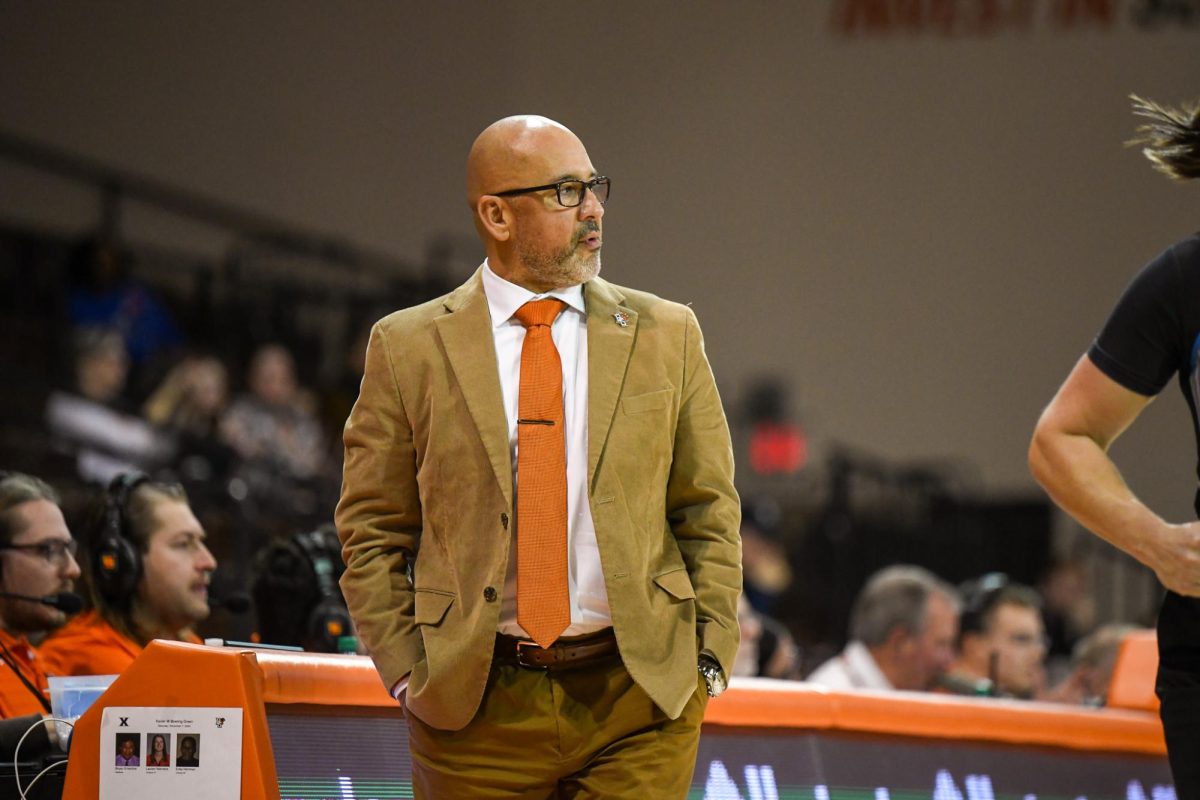Since the 2009-10 season, the BG hockey team has been looking for defensemen to supply offensive production from the blue line.
It hadn’t been easy. A combination of inexperience and players with a more defense-oriented mindset hindered that search. During the past two seasons, no BG defenseman posted double-digit points.
However, that changed in a big way this season. For the first time since Kyle Page posted 17 points in the 2009-10 season, BG has a blue liner with double-digit points.
In fact, the Falcons have two who’ve paired together this season. Bobby Shea and Mike Sullivan have developed a strong chemistry as the team’s top defensive duo.
The road they took to BG is as different as the two players were at the time they first committed to play for the Falcons. However, both have had great success this season in undertaking the same mission: to help BG hockey get back on the map in the Central Collegiate Hockey Association.
Different paths
Shea and Sullivan grew up 220 miles apart, separated by international lines, each in the shadow of a major hockey market.
Shea grew up in Harrison Township, Mich., a town of approximately 26,000 people located half an hour northeast of Detroit.
He started playing at the Great Lakes Sports City Ice Skating Rink in Fraser, Mich, playing for Belle Tire, Honeybaked and Little Caesars, three of the premiere Midget AAA Major teams in America.
“It was fun, I always loved going to the rink with my parents taking me to every game to support me,” Shea said. “Detroit’s a great area; from my perspective I think it’s the best place to grow up and play hockey at.”
As the level of competition grew, Shea began thinking more about playing hockey at the college level.
“When you’re playing youth hockey, you always think about college or the [Ontario Hockey League], because you’re from the Detroit area,” he said.
Sullivan grew up in the Toronto area, playing in the Great Canadian Hockey League for his midget hockey. In his final year playing in the GCHL, his team won provincials — the Canadian equivalent of state championships.
“It’s a really good youth hockey league,” Sullivan said. “A lot of the top guys from Ontario come out of there.”
Several of his teammates moved on to play in the OHL — one of the divisions of the Canadian Hockey League, the top junior hockey league in the world. Players who go to the CHL are paid stipends, which the NCAA has ruled causes them to lose their amateur status, thus making them illegible for NCAA competition.
Instead, Sullivan retained his college eligibility by playing in the Ontario Junior Hockey League.
Sullivan said the OJHL is a league that has been marred by “politics” the past 10 years, with owners who have sons not necessarily talented enough to play junior hockey on their teams. With 36 teams at one point, he said the league developed a reputation of being “watered down.”
“They keep working every year on trimming teams, cutting the fat, in order to get it back to where the league was 10 years ago,” Sullivan said. “It’s a good league for young players. You play against some older guys so you get used to the strength and speed quickly.”
He experienced that trimming on a first-hand basis after two of the three teams he played for in the OJHL — the Ajax Attack and Markham Waxers — folded.
Sullivan first thought of playing college hockey in his second year in the OJHL. As a 17-year-old, Sullivan had been given a more offensive role on the team.
“Before that I was more of a stay-at-home guy,” Sullivan said. “I was at about a point-per-game my second year in junior and started to feel more confident.”
Shea took a path through juniors that many elite American midget hockey players take: the United State Hockey League.
He played two seasons for the Green Bay Gamblers, playing alongside current CCHA players Reed Seckel of Northern Michigan and Steven Summerhays of Notre Dame.
“We had a really good team the second year,” Shea said, before naming off several of the defensemen he played with who are currently playing NCAA hockey. “I think that Green Bay was the best place to play in the USHL.”
Unlike Shea, Sullivan had a taste of college hockey before his time at BG. His older brother, Dan, played four years at Niagara University, and currently plays professionally in Italy.
“He played only about an hour and a half from where I live in Toronto, so I went there a lot,” Sullivan said. “I’ve watched close to a thousand junior and NCAA games with my family. I would remember my dad saying, ‘Hey Mike, here’s a good defenseman, watch this guy.’ And I took that to what my brother did. I’d try and not take his bad habits, and take his good habits and put them into my everyday game.”
Choosing BG
While Shea committed to BG with the program’s future in doubt, Sullivan came when it on slightly better footing.
Shea, now a senior, committed to BG when Scott Paluch was still the coach. After the 2008-09, the University’s administration flirted with terminating the hockey program in order to save money. Paluch left the school and there were more questions than answers available.
Shea said BG was the place he wanted to be, and even though he heard the rumors, he remained committed to the school.
“I communicated with [former defensemen] Ian Ruel and Max Grover because they were coming in at the same time as I was,” Shea said. “They said they were going to stick with it and I wanted to play for the coaching staff. I committed to the school because I wanted to be here.”
Nine other players joined Shea in committing to BG that year. He was one of five defenseman in that 2009-10 freshman class, and of them, only he and Ryan Peltoma remain on the team.
Only four of those 10 seniors are still with BG — Shea, Peltoma, forward Marc Rodriguez and goalie Andrew Hammond. Through their four years, they have developed a strong friendship.
“Any time you’re with someone for four years your relationship is going to be good,” Peltoma said. “I consider Bob one of my really good friends. We’ve been through a lot. It’s just fun coming to the rink with one of your really good friends. It makes everything a little better and more fun.”
Coach Chris Bergeron began recruiting Sullivan, now a sophomore, in May of 2010, shortly after Bergeron was named head coach at BG. He first saw Sullivan play at the World Junior A Challenge in 2010.
“I just took that as any other game,” Sullivan said. “I played some of the best hockey I’ve played and coach Bergeron came up and told me he liked what he saw. To get some positive reinforcement from him, to have him say I kind of stood out, it gave me a lot of confidence.”
The lure of playing in the CCHA, as well as the atmosphere he felt at the BGSU Ice Arena when he came on a recruiting visit, helped drive Sullivan to commit.
While he has only been at BG for less than two years, Sullivan has potentially helped BG in at least one other recruiting instance.
He grew up in Toronto with forward Mark Cooper, and the freshman said Sullivan’s presence at BG has helped him immensely in his adjustment to college.
“When going through the process of choosing schools and applying here, he helped me a ton,” Cooper said. “He just told me what to expect and it was good to know somebody coming into freshman year because it gives you a comfort level of being able to focus on hockey and school and not worrying about having to make friends.”
Different players
Up until this season, Shea and Sullivan had themselves been drastically different players on the ice.
Shea was a highly defensive player and an agitator. In 107 games in the USHL, he racked up 17 points and 289 penalty minutes.
In his first three years at BG, in 99 games, he had only 16 points and 183 penalty minutes. He briefly dabbled at forward during his junior year, which helped lead to a then career-high nine points.
He said that experience at forward helped him gain a broader understanding of the offensive zone.
“When you’re a forward, it’s different, you have to chip pucks,” Shea said. “I think it gave me a little more poise, a different perspective.”
While he still demonstrates his defensive and agitator characteristics — he is a fixture on BG’s penalty kill and was involved in a major scrum as recently as this past Saturday against Northern Michigan — his offensive game has grown.
“What we see this year in Bobby Shea is a culmination of a long, hard-working career,” Bergeron said. “He’s a guy we thought had some offense to him, which is why we put him at forward last year. When he keeps the game simple, he’s really good defensively, too. He really deserves the year he’s having this year.”
While Sullivan said he started his career as a more defensive-minded player, he was brought to BG to provide some offensive pop from the blue line.
In 135 games in the OJHL, he had 93 points.
However, his first year at BG did not go as smoothly. Still adjusting to the college game, Sullivan posted only four points in 41 games.
“It was an up-and-down year,” he said. “My offense, it seemed like I wasn’t getting the right bounces, and when you aren’t getting the right bounces you lose confidence. I had times struggling finding my niche on the team.”
Sullivan said Bergeron had several conversations during the season about how he needed to find his game, and Sullivan took it upon himself to make sure he improved himself in the offseason.
“He’s a kid who is very hard on himself and he wants ‘it’ badly,” Bergeron said. “Sometimes when it doesn’t happen, he’s reacted and it seemed to make him play worse. Now he has this maturity about him that he can figure it out.”
Similar results
This season, Shea and Sullivan have combined to form one of the CCHA’s top-scoring defensive pairs.
Shea’s 19 points — three more than he had in his first three years at BG combined — rank him tied for second in the CCHA in defensemen scoring with Robbie Russo of Notre Dame.
Sullivan’s 15 points rank him tied for 13th in the CCHA in the same category. Among defensemen teammates, only Jacob Trouba and Mac Bennett of Michigan (38), Russo and Sam Calabrese of Notre Dame (36) and Simon Denis and Jason Binkley of Ferris State (36) have more combined points than Shea and Sullivan’s 34.
“He’s a really good player,” Shea said of Sullivan. “I like playing with him; our chemistry has been really good this year. We’ve played so much together that we know where the other is going to be. I know what he’s thinking most times and he knows what I’m thinking.”
The two started playing together last year against Bemidji State, but they struggled getting used to each other, Sullivan said.
“We were awful, I think we were minus-three on the weekend,” Sullivan said. “We didn’t have the chemistry.”
Repetition in the ice made the two more comfortable and improved their results.
“Eventually we just found it,” Sullivan said. “With repetition you just become comfortable with the person. Bob and I have been defensive partners since last Christmas, and eventually you’re going to know their ins-and-outs, their trends. We can find each other on the ice. We can recognize when someone is going to rush the puck or stay back and we kind of fall back on each other.”
They have played together long enough to offer one another constructive criticism in their games.
“They have a relationship where they can get after each other and be OK, in terms of on the ice when someone should’ve said something and didn’t,” Bergeron said. “They kind of bark at each other and there’s definitely no thin skin there and they handle it well.”
Bergeron said Shea’s influence has been a huge reason for the growth in Sullivan’s game this season.
“I think Bobby has been good for Mike in the way that [Bobby’s] been there and done it,” he said.
The road ahead
With each player at different points in their BG careers, they have different paths ahead for them.
Shea is at the tail end of his senior season at BG, with only four guaranteed games left. There remains the possibility for more, depending on the team’s success in the postseason.
Right now, he remains focused on helping the team get back to the CCHA semi-finals at Joe Louis Arena in Detroit.
“I’m really set and focused,” Shea said. “I want to go back to the Joe this year. It was a tough loss [last year] and leaves a bad taste in your mouth. Next year will come when it comes, but I want to focus on this year.”
For Sullivan, he still has two years remaining at BG. With the team’s upcoming move to the Western Collegiate Hockey Association, he is ready for the new challenges that will await the team in a new conference.
“I see a really bright future for us,” Sullivan said. “We’ll be able to play against teams that don’t really know us. I think our aggressive approach is really going to benefit us. The travel next year will allow us to be a tighter-knit group. I think we’ll be able to take this confidence over to the other conference.”


